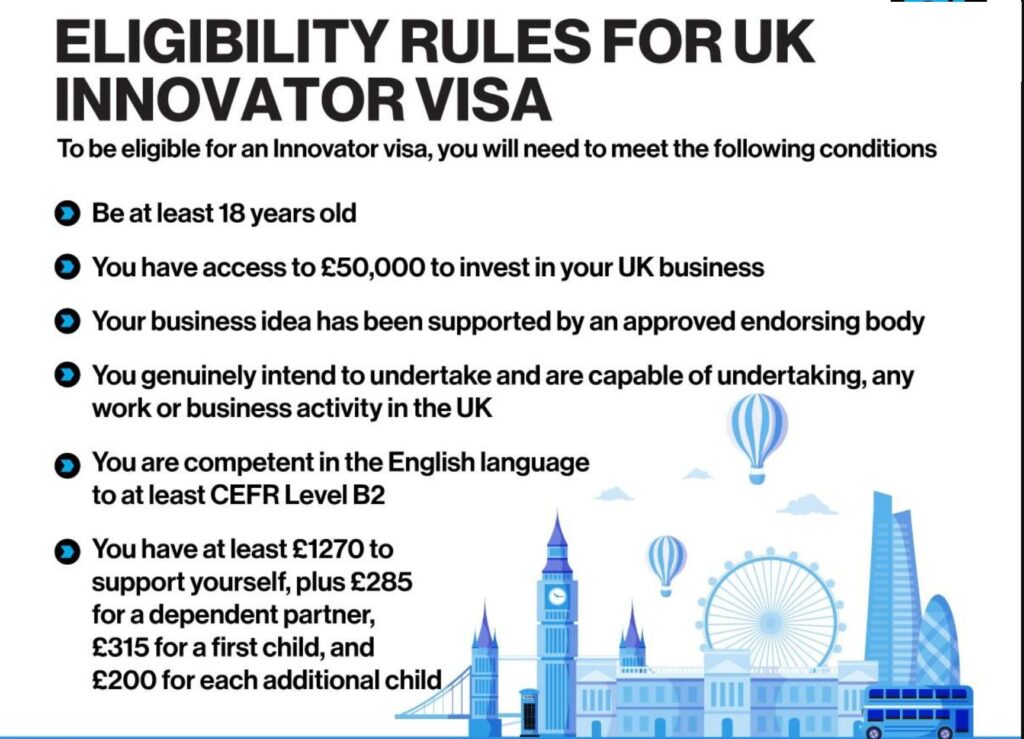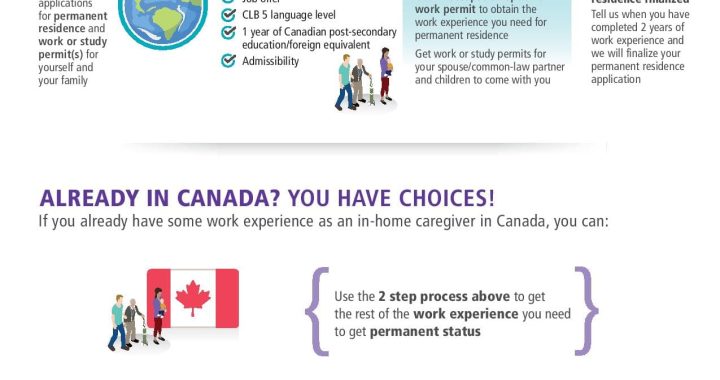Understanding Self Employment Visa for Quick Immigration to UK, its eligibility, fees, limitations and the process to apply

UK Self Employment Innovator Visa
The UK offers a Self-Employment Visa under the UK Immigration Rules for individuals who wish to work as self-employed or set up a business in the UK. This visa is generally granted under the Innovator Visa or the Start-up Visa, depending on the applicant’s situation.
Below is a detailed guide covering how to apply for the self-employment visa in the UK, eligibility requirements, supporting documents, application fees, duration, and limitations etc.
The Self-Employment Visa (primarily under the Start-up Visa and Innovator Visa) has become quite popular among immigrants to the UK, especially for those looking to start their own business or become self-employed in a thriving and diverse economy. Several factors contribute to this growing interest:
1. Entrepreneurial Opportunities
- The UK is known for its strong entrepreneurial ecosystem, with cities like London, Manchester, and Birmingham being hubs for tech startups, creative industries, and professional services. Immigrants with innovative business ideas see it as a great opportunity to grow their businesses in such an environment.
- Access to the UK market: Entrepreneurs find that the UK offers access to both local and European markets, providing a broad customer base, which can be especially attractive post-Brexit as the UK seeks to forge trade partnerships globally.
2. Talent and Innovation Hub
- The UK has long been recognized for its global standing in fields like technology, finance, healthcare, creative industries, and more. Innovators with expertise in these sectors often see the UK as a prime destination to launch their business ideas.
- The Start-up and Innovator Visa schemes support business ideas that are innovative, scalable, and viable. Many immigrants who have access to investment or have developed novel solutions are eager to take advantage of these pathways.
3. Supportive Ecosystem for Start-ups
- Endorsement bodies (such as business accelerators, universities, and venture capital firms) help validate and guide business ideas, offering a structured process to launch successfully. This gives immigrants a sense of security that their business idea is viable and has potential for growth.
- The UK government’s focus on innovation also provides opportunities for mentorship and funding, making it attractive to foreign entrepreneurs who want to turn their ideas into profitable businesses.
4. Route to Permanent Residency
- The Innovator Visa offers a direct pathway to Indefinite Leave to Remain (ILR) after 3 years, and from there, applicants can apply for British citizenship. This is a significant incentive for immigrants who seek long-term stability and eventual citizenship.
- Family members can also join the visa holder, making it a popular choice for families looking to settle in the UK long term.
5. Flexible Work and Lifestyle
- Immigrants applying for self-employment visas are attracted to the flexibility of being their own boss, as well as the potential for higher income, job satisfaction, and work-life balance that self-employment can provide. This is particularly appealing to those with entrepreneurial skills or professional expertise who want to break out of traditional employment.
6. Global Talent Pool
- The UK has traditionally been a welcoming country for international talent, drawing people from all over the world, especially from Europe, Asia, and Africa. The self-employment visa allows skilled immigrants with unique expertise to tap into the global talent pool and create businesses that can scale internationally.
7. Post-Brexit Climate
- While Brexit has created uncertainties in some sectors, many immigrants still view the UK as a land of opportunity for entrepreneurship. The government has streamlined some immigration pathways to attract talented business founders, recognizing the need to remain competitive on the global stage.
Challenges and Considerations
While the Self-Employment Visa is attractive, it does come with challenges:
- Financial Requirements: The requirement for investment (e.g., the £50,000 needed for the Innovator Visa) can be a barrier for some immigrants who don’t have ready access to funding.
- Endorsement Process: The endorsement requirement for the Start-up and Innovator Visas can be difficult for some applicants to navigate, especially if they don’t have strong business connections or networks in the UK.
- Sustainability and Success: Entrepreneurs must prove that their business idea is both innovative and viable in the competitive UK market. This often requires significant effort, market research, and business development expertise.
Overall, the Self-Employment Visa route is gaining popularity among immigrants who are keen to start a business in the UK or pursue self-employment. The country’s strong business environment, entrepreneurial support, and potential for long-term settlement make it an appealing choice for immigrants with the right skill set, ideas, and investment capacity.Types of Self-Employment Visas
1. Start-up Visa
This is for individuals who are at the beginning stages of their business journey in the UK. The business idea should be innovative, viable, and scalable.
2. Innovator Visa
This visa is intended for experienced business people who have a viable and innovative business idea and want to establish or run a business in the UK.
3. Eligibility Requirements
For Start-up Visa:
- You must be at least 18 years old.
- Your business idea must be new (you cannot join an existing business).
- The business idea should be innovative, viable, and scalable.
- You must have an endorsing body that supports your business idea. This could be a business accelerator, incubator, or a university.
- You must not have access to public funds.
For Innovator Visa:
- You must have an innovative, viable, and scalable business idea.
- The business must be endorsed by an authorized UK endorsing body (such as a business incubator or a trusted organization).
- You must be at least 18 years old.
- You should have a minimum of £50,000 to invest in your business (unless the business is already established and endorsed by an authorized body).
- You should demonstrate proficiency in the English language (minimum B2 level).
- You must have enough money to support yourself while you are in the UK.
4. Application Process
Step 1: Choose the Correct Visa Type
- If you are a first-time entrepreneur with a business idea that is innovative, but you don’t yet have significant funding or experience, apply for the Start-up Visa.
- If you are an experienced entrepreneur with a viable business and enough capital to invest, apply for the Innovator Visa.
Step 2: Obtain Endorsement
- For both visas, you need to be endorsed by an authorized UK endorsing body.
- Start-up Visa: Seek endorsement from a business incubator, university, or other organization that supports innovative ideas.
- Innovator Visa: Obtain an endorsement from a recognized UK organization that supports business ventures.
Step 3: Prepare Your Application
- Gather all necessary documents (see below).
Step 4: Submit the Online Application
- Submit your visa application online through the UK Government’s official website. You will need to pay the application fee and the immigration health surcharge (if applicable) as part of this process.
Step 5: Attend Biometrics Appointment
- Once you submit your online application, you may be asked to attend a biometric appointment (fingerprints and photo).
Step 6: Wait for Decision
- The UK Home Office will process your application, and you should receive a decision within 8 weeks (for Innovator and Start-up visas).
5. Supporting Documents
You will typically need the following documents:
- Passport or travel document (valid for the duration of your stay).
- Proof of business endorsement from a recognized UK endorsing body.
- Proof of English language proficiency (e.g., a valid English test score or a degree taught in English).
- Evidence of personal savings (bank statements) to show you can support yourself without public funds (minimum £1,270 for the Start-up Visa and Innovator Visa).
- Proof of investment funds (for the Innovator Visa, minimum £50,000 investment in business).
- Criminal record certificate (if you are applying from certain countries).
- Details of your business idea (for Start-up applicants) or a detailed business plan (for Innovator applicants).
Note: Additional documents may be requested depending on your circumstances.
6. Application Fees and Costs
- Start-up Visa application fee: £363 (if applying from outside the UK).
- Innovator Visa application fee: £1,021 (if applying from outside the UK).
You will also need to pay the Immigration Health Surcharge (IHS), which is £624 per year for each year of your visa.
7. Processing Time
- The processing time for the Start-up Visa and Innovator Visa is generally about 8 weeks from the date of application.
- You can pay an additional fee for a priority service that may speed up processing to 24 hours or 5 working days (depending on the option).
8 Duration of the Visa
- Start-up Visa: This visa is granted for up to 2 years and cannot be extended. However, after 2 years, you can apply for an Innovator Visa if your business is successful.
- Innovator Visa: This visa is granted for 3 years and can be extended indefinitely, provided your business remains viable and meets the endorsement criteria.
9. Limitations of the Visa
- You cannot switch to a different visa type unless you meet specific criteria (e.g., applying for an Innovator Visa after 2 years on a Start-up Visa).
- You cannot work in a job outside of your self-employed business.
- You are restricted to the business that was endorsed at the time of your visa application.
10. Path to Settlement
- After holding an Innovator Visa for at least 3 years, you can apply for Indefinite Leave to Remain (ILR), which is the first step toward permanent residency.
- To qualify for ILR, you must prove that your business has been successful and meets the Home Office’s requirements for continued investment and innovation.
Once you have ILR, you can eventually apply for British Citizenship after holding ILR for at least 12 months (or 3 years if married to a British citizen).
11. Additional Information
- Innovator Visa Holders can have their business idea assessed periodically to ensure it is meeting the growth and scalability goals set out in the endorsement.
- Start-up Visa Holders will need to transition to another visa type (like the Innovator Visa) to continue their self-employed journey beyond 2 years.
- Family members (spouse/partner and children under 18) can accompany you to the UK on the same visa, but they must show proof of sufficient financial support.
Summarising:
The UK Self-Employment Visa allows entrepreneurs to start a business or work as self-employed in the country. It has clear eligibility criteria, and the application process involves endorsement from a recognized UK body, submission of appropriate documents, and payment of relevant fees. The Start-up Visa and Innovator Visa are the primary routes, and both offer pathways toward permanent residency if the applicant’s business proves successful.

 New Education Assessment Requirement for Caregivers: A Major Setback for Immigration to Canada
New Education Assessment Requirement for Caregivers: A Major Setback for Immigration to Canada  ICE Deportations at Immigration Hearings: Truth, Risks & Legal Remedies
ICE Deportations at Immigration Hearings: Truth, Risks & Legal Remedies  What happens if the marriage ends before the conditional green card is granted to spouse
What happens if the marriage ends before the conditional green card is granted to spouse  Marriage Visa to the USA: Your Ultimate Guide to Love, Law, and a Green Card!
Marriage Visa to the USA: Your Ultimate Guide to Love, Law, and a Green Card!  Employment Scams Targeting Immigrants in Canada: How to Detect, Avoid, and Fight Back
Employment Scams Targeting Immigrants in Canada: How to Detect, Avoid, and Fight Back  America’s 2025 Deportation Crackdown: Should You Stay or Self-Deport?
America’s 2025 Deportation Crackdown: Should You Stay or Self-Deport?  Canada Removes Points for Prearranged Job Offers in Express Entry: What It Means for Immigration Applicants
Canada Removes Points for Prearranged Job Offers in Express Entry: What It Means for Immigration Applicants